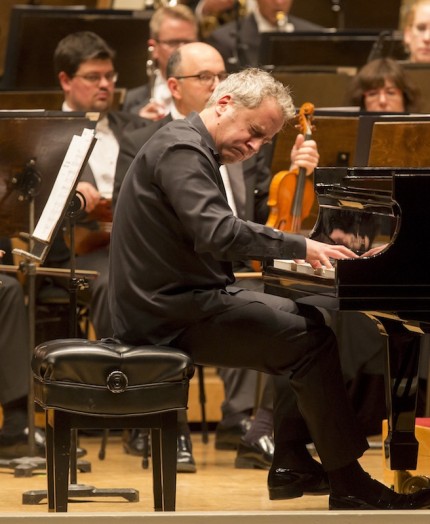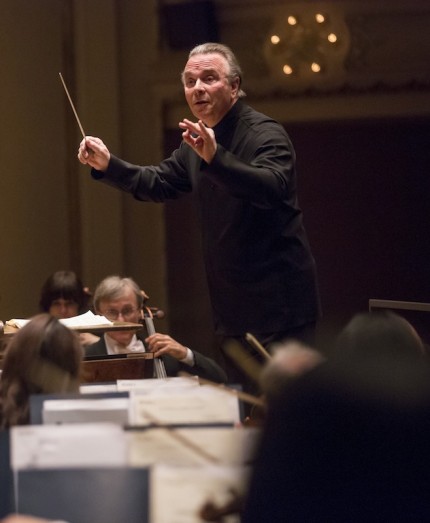Elder, CSO deliver powerful performances with Slavic program

Few 20th-century composers enjoyed as long-lasting a connection with the Chicago Symphony Orchestra as Bela Bartók. The CSO gave the U.S. premiere of his Piano Concerto No. 2 in 1939, Bartók performed it with the orchestra a few years later, and both Fritz Reiner and Sir Georg Solti provided their Hungarian compatriot’s music with consistent and first-rate advocacy in the concert hall and on recordings, which did much to cement Bartok’s reputation and popularity.
The Second Piano Concerto was the centerpiece of Thursday night’s Czech-Hungarian program led by Sir Mark Elder, with Jeremy Denk as soloist.
Denk’s nervy virtuosity proved a fine fit for this work. The pianist’s head-shaking and theatrical mannerisms were a distraction at times, yet Denk clearly possesses the sterling technique to handle the score’s spiky virtuosity, putting across its relentless bravura. Denk brought a pointillist elegance and searching expression to the Adagio’s nachtmusik mystery as well as breakout virtuosity to the central section. He served up the edgy bonhomie and fireworks of the finale with power to burn, with David Herbert’s powerful timpani contributions lending added punch to Elder’s alert accompaniment.
Elder led the last local performance of the Scherzo capriccioso seven years ago at the excellent Dvořák Festival he helmed with the CSO. The conductor led off the evening with a spirited performance of this engaging work, bringing a pointed edge to the festive main theme that contrasted it with the plaintive English horn motif, elegantly played by Scott Hostetler.
The second half of the concert was devoted to Leoš Janáček. As Elder noted in a brief introduction, even now no one else’s music sounds like that of the Czech composer, who wrote an astounding series of distinctive masterworks—operas as well as concert works–in his final ten years.
The Chicago Symphony has previously played Vaclav Talich’s suite from Janáček’s opera The Cunning Little Vixen but Elder opted for Charles Mackerras’s 2008 version, heard in its CSO debut. Even without the vocal element, the music is utterly beguiling in its gentle charm, not-too-scary shadows and masterful scoring.
The arrangement by Mackerras–a peerless Janáček interpreter–is done with a sure and loving hand and allows Janacek’s captivating music with its forest creatures, evocative birdsong, and nocturnal serenity to emerge winningly. Elder and the musicians offered a sensitive and glowing performance. When will we heard this wonderful opera again in Chicago? (Or any Janáček opera for that matter.)
Taras Bulba is sterner stuff, drawn from Gogol’s tales of the legendary Ukrainian Cossack and his battles against the Poles. Bulba was long a nationalist inspiration to peoples under the yoke of other countries.
Elder drew a boldly outlined and expressive performance that brought out the distinctive scoring of Janáček’s tripartite tone poem, with its jagged brass phrases, uninhibited woodwinds, meditative organ solos, and Moravian pungency. There was little doubting Bulba’s appeal to Janáček in the concluding section of the Cossack’s death, with the large orchestra and organ rising to a sonorous and triumphant coda. The orchestra playing was superb across all sections, with especially inspired contributions from timpanist Herbert, English hornist Hostetler and violinist Stephanie Jeong.
The program will be repeated 8 p.m. Saturday and 7:30 p.m. Tuesday. There will also be a Beyond the Score program about Leoš Janáček that will feature his works 7:30 p.m. Friday and 3 p.m. Sunday. cso.org; 312-294-3000.
Posted in Performances




Posted Mar 16, 2016 at 2:37 pm by thomas ehrhardt
Mr.Johnson
As to Denks “head shaking and theatrical mannerisms” being a distraction at times:
First, listen to the music. Physical expressions of the sounds produced will easily be accepted given the character of this piece.